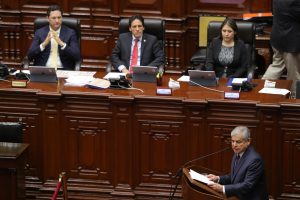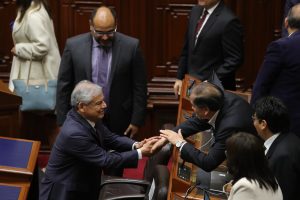
Lima, Sep 19 (EFE).- Peru’s prime minister appeared in Congress on Wednesday and urgently called on lawmakers to give their backing to a package of government-proposed anti-graft bills, a step that is needed before the proposals can be put to a popular referendum on Dec. 9.
Congress already approved one of the bills a day before Cesar Villanueva’s appearance and two days after President Martin Vizcarra, who had accused lawmakers of dragging their feet on the measures, announced that failure to approve them would amount to a vote of no-confidence in his Cabinet.
Vizcarra opted for that procedure in a bid to spur the unicameral legislature into action on the bills, which have been proposed amid widespread popular anger over corruption.
If lawmakers were to defy Vizcarra’s wishes, they not only would be forcing a second Cabinet to resign but also – under Peruvian law – clearing the way for the president to dissolve Congress and call for new legislative elections.

One bill already approved by the lawmakers would overhaul the National Council of the Magistrature (CNM), an autonomous body whose primary function is to appoint and ratify judges and prosecutors.
But bills that would reinstitute a bicameral Congress, eliminate re-election for lawmakers and establish stricter campaign-financing rules have not yet been approved.
Vizcarra wants all four bills approved by an Oct. 4 deadline so they can be put to a popular referendum in December.
“We’re not aiming for partial solutions. We’re aiming for a comprehensive plan. The four bills are part of this comprehensive project (because) they’re four bills that will allow us to begin a great change in this country’s history,” Villanueva told lawmakers.
Most blocs in Congress have expressed support for the three remaining bills, but the largest party in Congress – the conservative opposition Popular Force – slammed the move earlier this week as unconstitutional.
Thousands of protesters took to the streets in July after secret recordings emerged in which high-ranking judges appeared to be making backroom deals on criminal sentences and promotions.
That scandal broke just months after Vizcarra’s predecessor, Pedro Pablo Kuczynski, resigned after being accused of hiding his ties to Brazilian construction giant Odebrecht, which has admitted to bid-rigging schemes that involved the payment of hundreds of millions of dollars in bribes to officials in more than a dozen countries.
